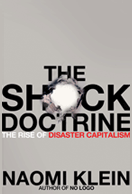The Shock Doctrine

Disaster Capitalism in Action: banks
Banks Refuse to Publicly Disclose How Bailout Money is Being Spent
Matt Apuzzo, Associated Press, December 22, 2008
"'We've lent some of it. We've not lent some of it. We've not given any accounting of, "Here's how we're doing it," said Thomas Kelly, a spokesman for JPMorgan Chase, which received $25 billion in emergency bailout money. 'We have not disclosed that to the public. We're declining to.'
"The Associated Press contacted 21 banks that received at least $1 billion in government money and asked four questions: How much has been spent? What was it spent on? How much is being held in savings, and what's the plan for the rest? None of the banks provided specific answers....
"No bank provided even the most basic accounting for the federal money. 'We're choosing not to disclose that,' said Kevin Heine, spokesman for Bank of New York Mellon, which received about $3 billion....Heine, the New York Mellon Corp. spokesman who said he wouldn't share spending specifics, added: 'I just would prefer if you wouldn't say that we're not going to discuss those details.'"
Bailed Out Banks Give $1.6 Billion to Executives
Frank Bass and Rita Beamish, Associated Press, December 22, 2008
"Banks that have their hands out in Washington this year were handing out multimillion-dollar rewards to their executives last year. The 116 banks that so far have received taxpayer dollars to boost them through the economic crisis gave their top tier of executives nearly $1.6 billion in salaries, bonuses and other benefits in 2007, an Associated Press analysis found.
"That amount, spread among the 600 highest paid bank executives, would cover the bailout money given to several banks that have shared in the $188 billion that Washington has doled out in rescue packages so far.
"Some banks trimmed their executive compensation in the face of faltering performance that foreshadowed the current economic crisis, but they still granted multimillion-dollar packages. Benefits included cash bonuses, stock options, personal use of company jets and chauffeurs, home security, country club memberships and professional money management, the AP review of federal securities documents found."
Senator: Executive Pay Limits in Bailout "Are All but Gone"
Amit R. Paley, Washington Post, December 15, 2008
"Congress wanted to guarantee that the $700 billion financial bailout would limit the eye-popping pay of Wall Street executives, so lawmakers included a mechanism for reviewing executive compensation and penalizing firms that break the rules. But at the last minute, the Bush administration insisted on a one-sentence change to the provision, congressional aides said. The change stipulated that the penalty would apply only to firms that received bailout funds by selling troubled assets to the government in an auction, which was the way the Treasury Department had said it planned to use the money.
"Now, however, the small change looks more like a giant loophole, according to lawmakers and legal experts. In a reversal, the Bush administration has not used auctions for any of the $335 billion committed so far from the rescue package, nor does it plan to use them in the future. Lawmakers and legal experts say the change has effectively repealed the only enforcement mechanism in the law dealing with lavish pay for top executives. 'The flimsy executive-compensation restrictions in the original bill are now all but gone,' said Sen. Charles E. Grassley (Iowa), ranking Republican on of the Senate Finance Committee....
"Congressional leaders are also concerned that the Treasury might simply choose not to enforce the rules or be unwilling to impose financial penalties that could further weaken a firm and send the economy deeper into a tailspin."
Firms Receiving Bailout Funds Continue Multi-Million Dollar Sports Sponsorships
Justin Rood, ABC News, November 24, 2008
"AIG, Citibank and a number of other federally bailed-out financial institutions have no plans to cancel hundreds of millions of dollars in sports team sponsorships, even as they take billions in taxpayer support, ABC News has found....
"Struggling Citibank just sealed a multi-billion-dollar emergency "backstop" deal with the U.S. government. The financial behemoth, suffering with billions in bad mortgage-related assets on its books, recently shed 53,000 workers and saw its stock price lose over half its value. Yet it's in a 20-year contract to pay the New York Mets $400 million to name the team's new stadium 'Citi Field'....
"Citi isn't alone: Imploding insurance giant AIG is paying the British soccer team Manchester United $125 million for the privilege of having its logo appear on Man U's uniforms. That, despite the fact the firm is standing largely thanks to a $150 billion lifeline from the U.S. Treasury."
Treasury Department Snuck a Windfall Clause for Banks into the Bailout Bill
Amit R. Paley, Washington Post, November 10, 2008
"The financial world was fixated on Capitol Hill as Congress battled over the Bush administration's request for a $700 billion bailout of the banking industry. In the midst of this late-September drama, the Treasury Department issued a five-sentence notice that attracted almost no public attention.
"But corporate tax lawyers quickly realized the enormous implications of the document: Administration officials had just given American banks a windfall of as much as $140 billion.
"The sweeping change to two decades of tax policy escaped the notice of lawmakers for several days, as they remained consumed with the controversial bailout bill. When they found out, some legislators were furious. Some congressional staff members have privately concluded that the notice was illegal. But they have worried that saying so publicly could unravel several recent bank mergers made possible by the change and send the economy into an even deeper tailspin."
See Also:
Treasury to Review New Tax Break Plan, New York Times, November 19
Schumer Questions IRS Rule Aiding Wells-Wachovia, Reuters, October 30
Obscure Tax Breaks Increase Cost of Financial Rescue, Wall Street Journal, October 18
After Change in Tax Law, Wells Fargo Swoops In, Washington Post, October 4
What Crisis? Banking Lending is on the Rise, Say Experts
Mike Meyers, Minneapolis Star-Tribune, November 2, 2008
"The nation indeed may be facing a financial crisis, with large institutions failing in the wake of multibillion debts, but most bank-lending to business customers actually has been on the rise....
"'The story goes that they [banks] are holding on to the money or putting it into Treasury bills,' said Lawrence Christiano, a Northwestern University economist and consultant to the Federal Reserve Bank of Minneapolis. 'That seems to fly directly into the face of the evidence that's out there.'
"It's a puzzle that's getting little attention, even as hundreds of billions of taxpayer dollars are devoted to fixing a problem that seems belied by government figures. 'Their own data seems to contradict their position,' said V.V. Chari. 'It would be valuable for them to explain what they're talking about.'
"The $700 billion taxpayer bailout of large players in the financial system reminds Chari of the buildup to the Iraq war. 'The analogies with the war in Iraq are more than disturbing,' Chari said. 'We're again hearing things like: "We know things you don't know. Trust us."
Goldman Sachs, Merrill Lynch Take Bailout Money, Slash Jobs
Stephen Gandel, Stephen Gandel, October 27, 2008
"Uncle Sam has a new name on Wall Street — Sugar Daddy. Bonuses for investment bankers and traders are projected to fall 40% this year. But analysts, compensation consultants and recruiters say the drop would be much more severe, perhaps as much as 70%, were it not for the government's efforts to prop up financial firms....
"One factor mitigating the financial industry's bonus intentions is the fact that there could be far fewer employed Wall Streeters by the time year-end payouts are made. Goldman Sachs reportedly plans to cut 10%, or 3,250 workers, from its payrolls. Barclays is expected to eliminate 3,000 jobs from the former investment-banking division of Lehman Brothers, which it acquired in September. And Merrill Lynch's John Thain recently said that he expects thousands of job cuts in the wake of his firm's acquisition. All told, Hintz expects Wall Street employment to fall 25%, which could mean a loss of 43,250 jobs in New York City alone and more than 200,000 jobs nationwide by the end of 2009."
Treasury Official Says Banking Consolidations Are a Goal of the Bailout
Mark Landler, New York Times, October 21, 2008
"In a step that could accelerate a shakeout of the nation's banks, the Treasury Department hopes to spur a new round of mergers by steering some of the money in its $250 billion rescue package to banks that are willing to buy weaker rivals, according to government officials.
"As the Treasury embarks on its unprecedented recapitalization, it is becoming clear that the government wants not only to stabilize the industry, but also to reshape it. Two senior officials said the selection criteria would include banks that need more capital to finance acquisitions.
"'Treasury doesn't want to prop up weak banks,' said an official who spoke on condition of anonymity, because of the sensitivity of the matter. 'One purpose of this plan is to drive consolidation.'"














